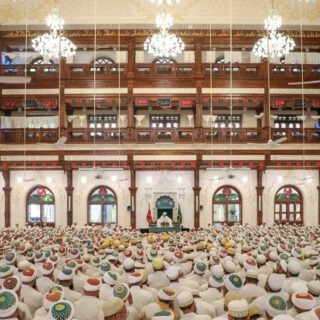“May Allah shower His mercy on Malik! I swear by Allah, had he been a rock he would have been a boulder; has he been iron he would have been a sword”. These words uttered by Amirul Mumineen Maulana Ali SA upon hearing of Maulana Malik al-Ashtar’s RA shahaadat reveal his revered status. His shahaadat impacted Maulana Ali SA in a profound way; the anguish and sorrow he felt were evident on his face, and he said, “I believe that his death has broken my back and shattered [the hearts of] Muslims.”
Maulana Malik al-Ashtar RA was amongst the hudud fodalaa’ of Amirul Mumineen AS and from the Madhij tribe of Yemen. He was tall and strong, commanding a great presence; having deep-set eyes, an aquiline nose and a soft, peppered beard. He was renowned for his bravery, his courage and valor evident in the battles of Jamal and Siffeen.
In 36 AH, during the battle of Jamal, Amirul Mumineen AS gave Maulana Malik al-Ashtar RA charge of the right side of his army, Maulana Ammar b. Yaasir RA the left side while Amirul Mumineen AS took control of the middle. On the command of Amirul Mumineen AS, Maulana Malik al-Ashtar RA advanced towards the opposing forces slaying many of their combatants. As he battled, he recited extempore numerous verses of poetry, extoling Amirul Mumineen SA and rebuking all those who had set out against him. Following the battle of Jamal, as Amirul Mumineen AS was returning from Basra to Kufa, he directed Maulana Malik al-AshtarRA to be at the helm of the victorious army.
As Amirul Mumineen AS journeyed towards Siffeen, he passed through Raqqah. In order to proceed further, he commanded them to allow use of a bridge, to which the inhabitant of the area refused. At that instant, Maulana Malik al-Ashtar RA stepped forward berating them, ‘By Allah, if you do not comply with the words of Amirul Mumineen, I will draw my sword and take on each and every one of you; I will seize your lands and claim your wealth’. Upon hearing these words, they immediately made way. Amirul Mumineen AS and all those with him passed along the bridge while Maulana Malik al-Ashtar RA accompanied by three horsemen stood watch until the last of them had crossed over.
In 37 AH, during the battle of Siffeen, the army of Shaam took control of the Euphrates and prevented Maulana Ali SA and his army from drinking water. Maulana Ali SA appealed to Muaawiyah to not deny anyone of water, but he refused. Finally, when Maulana Ali SA decided to wrest control of the water back he sent Maulana Malik al-Ashtar RA who removed the opposing army from the river. In one more revelation of how Maulana Ali SA personified his kalaam mubarak ‘Do good towards those who have done ill towards you’, he did not deny the people of Shaam access to the river as they had denied him, but rather allowed them access to the river.
As the forty-day long battle of Siffeen unfurled, Maulana Malik al-Ashtar RA battled many warriors of the Syrian army, slaying them all. In his narration of the events of Siffeen, al-Dai al-Ajal Syedna Idris Imaduddin RA details the various ways in which Maulana Malik al Ashtar RA rendered services to Amirul Mumineen AS: through his valor, his counsel, his eloquence, his conviction and his character.
Following the Battle of Siffeen, and the events that transpired in its aftermath, Amirul Mumineen AS appointed Maulana Malik al-Ashtar RA as the governor of Egypt. In a letter to the people of Egypt, Amirul Mumineen AS wrote:
I have sent towards you all a servant among Allah’s servants. One who remains vigilant in times of fear and difficulty, one who never retreats in the face of adversaries be it the most trying of circumstances. He is more severe on enemies than raging flames; he is Malik bin Haarith a brother of Madhij [tribe]. Listen to his words and obey his commands…If he directs you to go forth then do so; if he orders you to remain then do so. For he will never advance, attack or retreat but on my orders.
Maulana Malik al-Ashtar RA was poisoned just as he was about to enter Egypt. When Muaawiyah heard of his appointment he was filled with dread. Well aware of Maulana Malik al-Ashtar’s RA aversion to him and his intolerance towards his transgressions, he stated, “Ali in Iraq and Malik in Misr is a harbinger of our end”. From Shaam, he sent a follower of his to poison him. Before sending him to Egypt, Muaawiyah called upon the people of Shamm to pray for his success. The man met Maulana Malik al-Ashtar RA at Qulzum (Clysma), offered him a place to rest and prepared a meal for him. He then offered him a drink containing honey mixed with poison. Maulana Malik al-Ashtar RA consumed it and attained shahaadat.
Maulana Malik al-Ashtar RA rests in Marj on the outskirts of Cairo. Al-Dai al-Ajal Syedna Mohammed Burhanuddin RA constructed his Qubbah Mubarakah and inaugurated it in Rajab, 1419 AH.
Maulana Malik al-Ashtar RA was amongst the most devoted followers of Amirul Mumineen AS, possessing a strong, pure love for him. He was such that there is no other like him when it comes to his strength and determination in the cause of Allah and his firmness upon all those who are disloyal and treacherous. His stand in the services of Amirul Mumineen AS, upholding the tenets of faith is exemplary. Such was his reverence, that in the days leading to his shahaadat, Amirul Mumineen AS would remember him and his other companions: ‘where has Malik al-Ashter gone? Where has he gone?!’ He would remember all those who had attained shahaadat and weep for them.
To forgive others is a sign of courage; but to do good towards those who have wronged us calls for even greater courage, as exemplified by Maulana Malik al-Ashtar RA. Once as he was passing through a market, a man attempted to hold him to ridicule. Maulana Malik al-Ashtar RA ignored this transgression and continued on his way. After he had passed, a passerby chided that man pointing out to him that the person whom he had wronged was none other than Maulana Malik al-Ashtar RA, the companion of Maulana Ali SA. Realizing his folly, the man became apprehensive and immediately went in Maulana Malik al-Ashtar’s RA pursuit in order to seek his forgiveness. He found Maulana Malik al-Ashtar RA in the masjid praying namaaz. When he finished his prayers, the man fell on his feet and begged for forgiveness. Maulana Malik al-Ashtar RA replied, “Do not fret! It was only for your sake that I had come to the masjid. I prayed that may Allah forgive you for what you did to me”. The man was stunned by his benevolence and professed his deep gratitude to him. Following the narration of this incident, al-Dai al-Ajal Syedna Mohammed Burhauddin RA addressed Mumineen, ‘if ever anyone ridicules or mocks you, treats you with contempt; do not take it to heart. Ignore him, forgive him’.
Maulana Malik al-Ashtar RA shows us that true companionship of Maulana Ali AS is attained by adhering to the guidance he has bestowed. In his munaajaat shareefah of 1419 AH, al-Dai al-Ajal Syedna Mohammed Burhanuddin RA called upon Mumineen to abide by the exceptional conduct of Maulana Malik al-Ashtar RA whenever they feel that someone has wronged them:
And in forgiveness may they (Mumineen) be like Maulana Malik
al-Ashtar RA; emulating his exemplary conduct and behavior.
Today, with the noble intention that we inculcate in ourselves the lofty traits and characteristics personified by Awliyaaullah, al-Dai al-Ajal Syedna Aali Qadr Mufaddal Saifuddin TUS repeatedly reminds us of the words of Amirul Mumineen AS: Do good towards those who have done ill towards you’. May we assimilate such values in our selves.








